Bird hybrid
A bird hybrid is a bird that has two different species as parents. The resulting bird can present with any combination of characters from the parent species, from totally identical to completely different. Usually, the bird hybrid shows intermediate characteristics between the two species. A "successful" hybrid is one demonstrated to produce fertile offspring. According to the most recent estimates, about 16% of all wild bird species have been known to hybridize with one another; this number increases to 22% when captive hybrids are taken into account.[1] Several bird species hybridize with multiple other species. For example, the mallard (Anas platyrhynchos) is known to interbreed with at least 40 different species. The ecological and evolutionary consequences of multispecies hybridization remain to be determined.[2]
.jpg.webp)
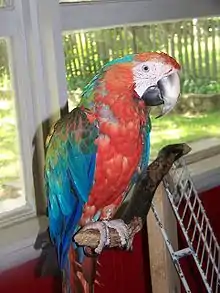
In the wild, some of the most frequently reported hybrids are waterfowl,[3] gulls,[4] hummingbirds,[5] and birds-of-paradise.[6] Mallards, whether of wild or domestic origin, hybridize with other ducks so often that multiple duck species are at risk of extinction because of it.[7][8] In gulls, Western × Glaucous-winged Gulls (known as "Olympic Gulls") are particularly common; these hybrids are fertile and may be more evolutionarily fit than either parent species.[9] At least twenty different hummingbird hybrid combinations have been reported, and intergeneric hybrids are not uncommon within the family.[10][11]
Wood-warblers are known to hybridize as well, and an unusual three-species warbler hybrid was discovered in May 2018.[12] Hybridisation in shorebirds is unusual but reliably recorded.[13][14][15][16][17][18][19][20]
Numerous gamebird, domestic fowl and duck hybrids are known. Captive songbird hybrids are sometimes called mules.[21] Numerous hybrid macaws exist in aviculture and occasionally occur in the wild. Some of these hybrid parrots are fertile with both the parent species and other hybrids.[22][23]
The scientific literature on hybridization in birds has been collected at the Avian Hybrids Project.[24]
The reality of bird hybrids also calls into question modern definitions of the word "species". Throughout literature, there tends to be a general vagueness regarding the word "species" and how it should be defined. Birds serve as an excellent example of this fluidity due to the remarkable cross-breeding opportunities.
Examples of hybrid birds
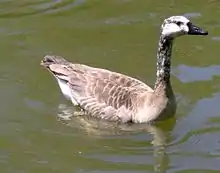 An intergeneric hybrid between Canada goose (Branta canadensis) and domestic goose (Anser anser domesticus)
An intergeneric hybrid between Canada goose (Branta canadensis) and domestic goose (Anser anser domesticus)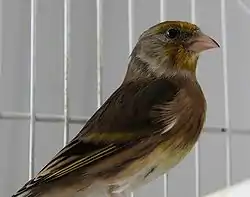
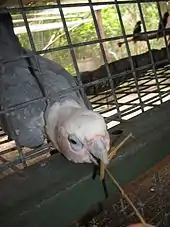 A probable galah × little corella intergeneric hybrid
A probable galah × little corella intergeneric hybrid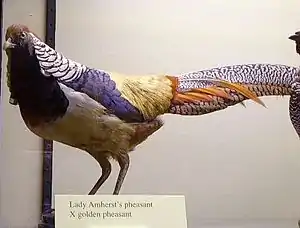
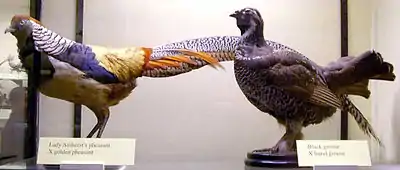 Hybrid pheasant (left) and hybrid of black grouse × hazel grouse (right)
Hybrid pheasant (left) and hybrid of black grouse × hazel grouse (right)
See also
References
- Ottenburghs, Jente; Ydenberg, Ronald C.; Van Hooft, Pim; Van Wieren, Sipke E.; Prins, Herbert H. T. (October 2015). "The Avian Hybrids Project: gathering the scientific literature on avian hybridization". Ibis. 157 (4): 892–894. doi:10.1111/ibi.12285. ISSN 1474-919X.
- Ottenburghs, Jente (14 June 2019). "Multispecies hybridization in birds". Avian Research. 10: 20. doi:10.1186/s40657-019-0159-4. ISSN 2053-7166.
- Kross, Jennifer. "Waterfowl Hybrids". Ducks Unlimited. Retrieved 4 December 2018.
- Cannings, Russell (March 2012). "Identifying Hybrid & Immature Gulls in Coastal B.C." (PDF). Birds Canada/Oiseaux Canada. Birds Studies Canada/Études des Oiseaux. Retrieved 4 December 2018.
- Kaufman, Kenn (20 April 2018). "Which Birds Produce the Most Hybrids?". Audubon. Retrieved 4 December 2018.
- "Hybrid Species of Bird of Paradise or Cendrawasih | Beauty of Birds". www.beautyofbirds.com. Retrieved 2018-12-04.
- "Mottled Duck Overview, All About Birds, Cornell Lab of Ornithology". www.allaboutbirds.org. Retrieved 2018-12-04.
- "Hawaiian Duck - Introduction". Birds of North America Online, birdsna.org. Retrieved 2018-12-04.
- Appleton, Dave (2014-06-05). "Bird Hybrids: Western Gull × Glaucous-winged Gull". Bird Hybrids. Retrieved 2018-12-04.
- says, It’s complicated: Hybrid hummingbirds in Mexico-Avian Hybrids (2014-12-12). "Apodiformes". Avian Hybrids. Retrieved 2018-12-04.
- "westtexashummingbirds.com: Hybrids". Retrieved 2018-12-04.
- GrrlScientist (9 November 2018). "Scientists Discover A Rare Bird That's A Hybrid Of Three Different Species". Forbes. Retrieved 4 December 2018.
- Jehl, J. R. Jr. (1985). "Hybridization and evolution of oystercatchers on the Pacific Coast of Baja California". Ornithological Monographs. 36 (36): 484–504. doi:10.2307/40168300. JSTOR 40168300.
- Jonsson, Lars (1996). "Mystery stint at Groote Keeten: First known hybrid between Little and Temminck's Stint?". Dutch Birding. 18: 24–28.
- McCarthy, Eugene M. (2006). Handbook of Avian Hybrids of the World. Oxford, UK: Oxford University Press. p. 170. ISBN 978-0-19-518323-8.
- McLaughlin K. A.; Wormington, A. (2000). "An apparent Dunlin × White-rumped Sandpiper hybrid". Ontario Birds. 18 (1): 8–12.
- Millington, Richard (1994). "A mystery Calidris at Cley". Birding World. 7 (2): 61–63. Archived from the original on 2004-06-17.
- Parker, Shane A. (1982). "A new sandpiper of the genus Calidris". South Australian Naturalist. 56: 63.
- Paulson, Dennis R. (2005). Shorebirds of North America: a photographic guide. Princeton, N.J.: Princeton University Press. ISBN 978-0-691-12107-9.
- Pierce, R. J. (1984). "Plumage, morphology and hybridisation of New Zealand Stilts Himantopus spp" (PDF). Notornis. 31: 106–130. Archived from the original (PDF) on 2007-10-24.
- "The National British Bird & Mule Club". Retrieved 18 January 2018.
- https://www.beautyofbirds.com/hybridmacaws.html
- https://www.thesprucepets.com/hybrid-macaws-390828
- Ottenburghs, Jente. "The Avian Hybrids Project". Avian Hybrids. Retrieved 2018-07-21.